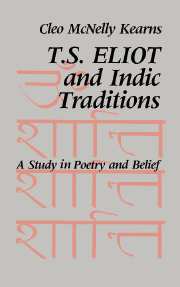Preface
Published online by Cambridge University Press: 07 October 2011
Summary
The Influence of Indic philosophy on the poetry of T. S. Eliot has puzzled and intrigued his readers ever since the appearance of The Waste Land with its allusions to Buddhist and Upanishadic texts and its formulaic ending “Shantih shantih shantih.” The apparently more casual references to the Bhagavad Gita in Four Quartets have intensified both the interest and the problems raised and have, in many ways, compounded the difficulties of understanding by their very simplicity. Clearly, Eliot's use of Indic traditions is important both to the comprehension of his work and to its various plaisirs du texte, but the nature and extent of that importance are difficult to estimate, for they involve not only a grasp of the Christian framework of Eliot's thought but an understanding of his approach to very different religious and cultural traditions. Even to approximate this understanding involves travel over some rather distant frontiers of language, literature, and religious practice and a return to some equally difficult problems in his poetic discourse itself.
A preliminary survey of the ground to be covered indicates, moreover, that a simple source study or a premature attempt to harmonize the Christian and Indic points of reference in Eliot's work will not do. Indic texts acted not only as a repository of images and local allusions for Eliot and, in time, as a preparation for certain important Christian insights, but often, and often more deeply, as a deliberately evoked catalyst for fundamental changes in his thought and style.
- Type
- Chapter
- Information
- T. S. Eliot and Indic TraditionsA Study in Poetry and Belief, pp. vii - xiiiPublisher: Cambridge University PressPrint publication year: 1987



